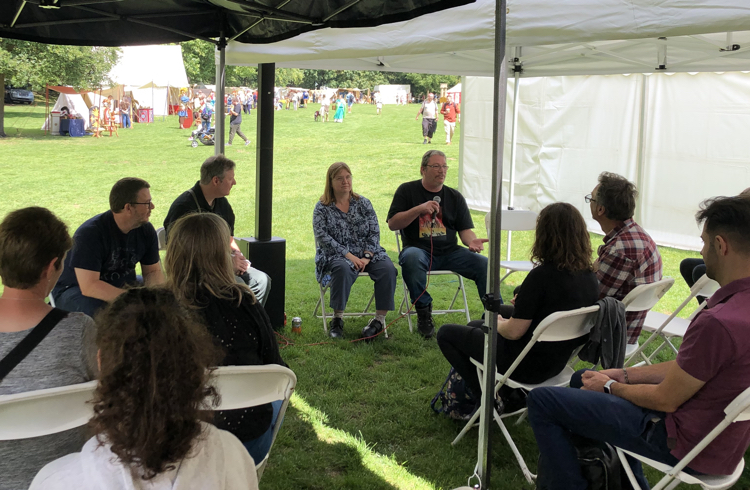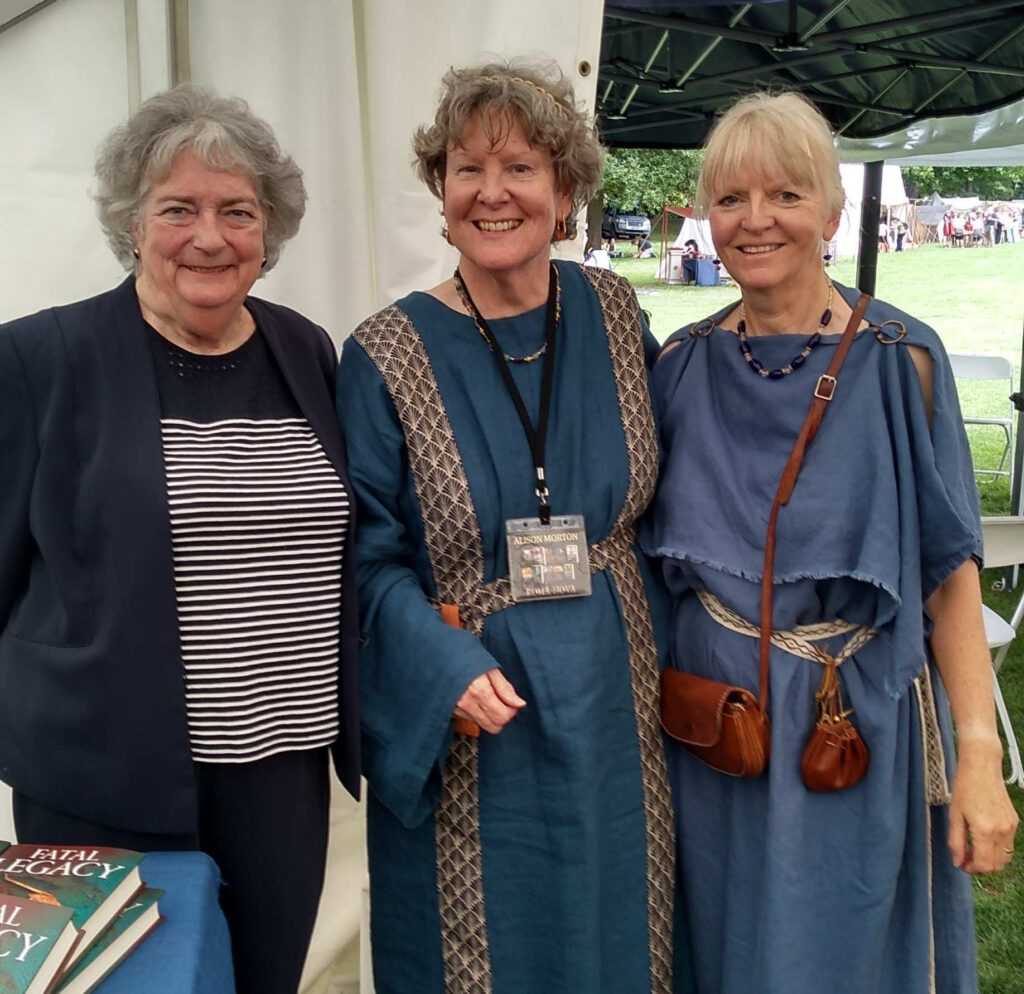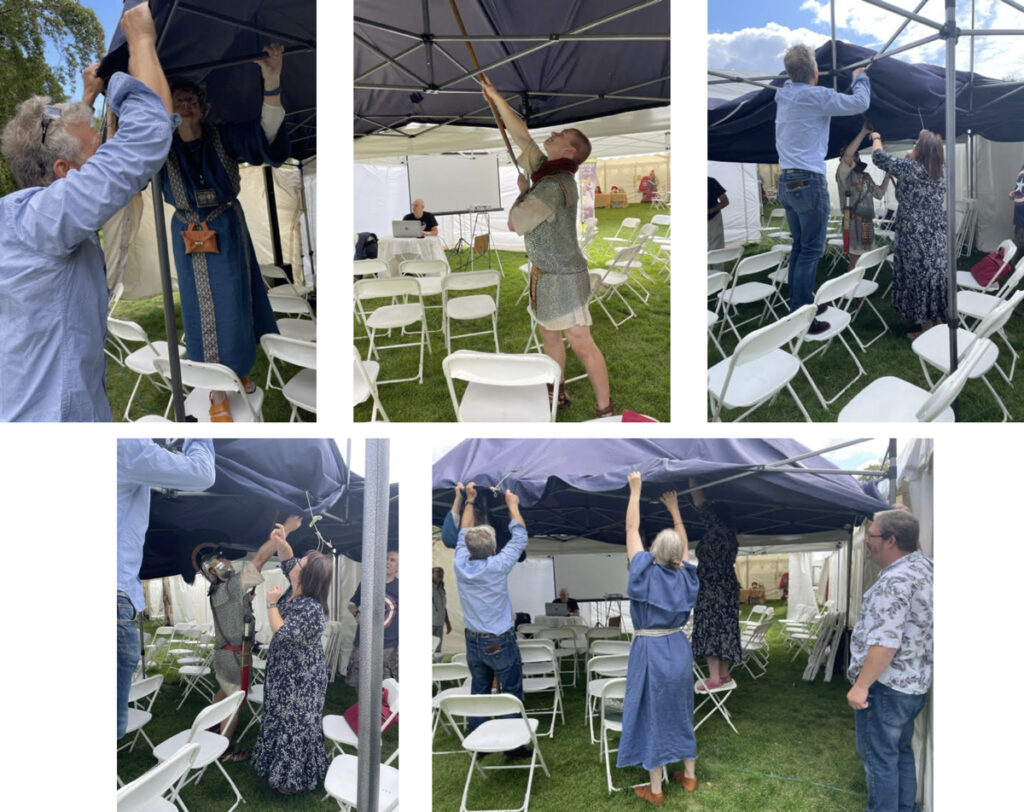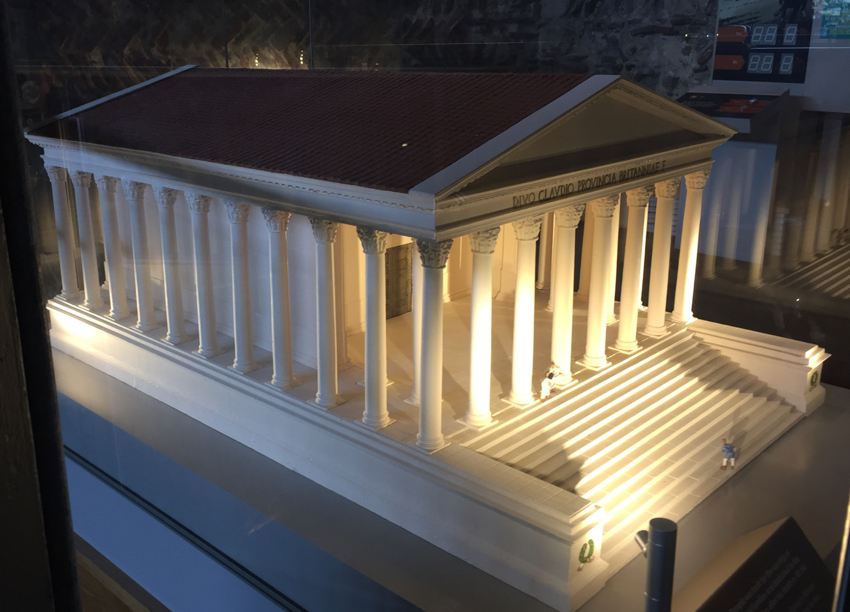Yes, they let us back to the second Roman festival in Colchester (Camulodonum for Romans) on 29 and 30 July.
The ‘old crowd of authors – Simon Turney (S J A Turney), Ruth Downie, Alex Gough, Harry Sidebottom, L J Trafford, Mary Jarratt, Robin Price and I from last year were enhanced by historian, author and archaeologist Simon Elliot of the University of Kent plus Nick Holmes of The Fall of the Roman Empire podcast. But to our immense pleasure, our star fellow author was Lindsey Davis of Falco and Flavia Albia fame!
As before, we ran a prize draw for visitors to the author tent and the winner scooped one of each of our books. He seemed very happy about it when I gave him the news! For two days, we met some wonderful readers, talked Romans and signed books. And much banter and news was exchanged…
What was there? Re-enactors, archaeological trust staff and volunteers running mosaic and amulet making and tables of Roman games, stalls with ceramics, furs, swords, oysters plus fabulous displays of gladiatorial skills. The cream were the displays by the famous Ermine Street Guard of uniform, equipment, training and (some terrifying!) tactics. I had taken my then young son to see them over twenty-five years ago and this year, it was my grandson who was as fascinated as his father had been.
The range of talks and panels expanded considerably. My first was as a participant in ‘Was the Fall of Rome inevitable?’ Harry and Nick were the strong leaders on this, much more expert than I, but I could chip in occasionally, particularly giving other historical contexts such as the Austro-Hungarian empire and the British and French empires. ‘Best and Worst Emperors’ gave LJ Trafford, Alex Gough, Simon Turney full rein under the chairmanship of Robin Price. Augustus, the first emperor, was voted the best by the audience and the sad and ineffective Honorius the worst.

Best and Worst Emperors panel. Left to right: Alex Gough, Robin Price (chair), L J Trafford, Simon Turney
Next up was a talk by Lindsey Davis about her work. Apart from her self-deprecating sense of humour, she gave a fascinating insight to her publishing journey as well as the world of Roman fiction.
Then I had an outbreak of nerves, but hid it well (I hope!); I chaired a panel on ‘Bringing Rome to Life on the Page’. Fair enough, I had written eight reasonably successful Roma Nova books, mostly thrillers, plus JULIA PRIMA in the 370s AD and readers seemed to like them and appreciate the research I had done for them. But my panellists were Harry, Nick and… Lindsey. Now, a moderator is supposed to control the conversation and I did worry beforehand about this aspect with such lively and knowledgeable participants, but they were professional, entertaining and thoroughly collegiate. We had such fun!
On Sunday, the last panel, ably chaired by Alex, was entitled ‘Gender, Sexuality and Identity in Ancient Rome.’ Harry and I were back on stage, but with LJ Trafford who had written a whole book about the subject. It was a frank, delightfully uninhibited and very informative discussion. Romans had complicated attitudes to and values about sex, marriage and gender that often sits awkwardly with today’s. of course, the knack in fiction is to convey that without upsetting the modern reader too much… 😉
This year, in celebration of launching JULIA PRIMA, I’d made a late 4th century costume for events. I’ll explain the ins, outs, traps and frustrations of putting it together in another post, but it seemed to work. I’d had a trial run at the Eboracum Roman Festival a few weeks before.
Tracey Turney (partner of Simon) persuaded me to do this little video about my latest book. https://youtu.be/_7gLa5UQprc
The wind? It blew a howling gale and took the roof off the talk tent gazebo, but authors and a Roman soldier were there to remedy the situation…
If you’d like to know more about Roman Colchester, read on…
Camulodunum was an important city in Roman Britain, and the first capital of the province. It became known/was marketed in the 1960s as the ‘oldest recorded town in Britain’. (I wonder if they have competition for that title now.) Originally the site of the Brythonic-Celtic oppidum of Camulodunon (meaning ‘stronghold of Camulos’), capital of the Trinovantes and later the Catuvellauni tribes, it was first mentioned by name on coinage minted by the chieftain Tasciovanus some time between 20 and 10 BC.
Following Claudius’s invasion of the enigmatic, foggy and slightly strange northern island in AD43, a Roman legionary base was built in the AD 40s on the site of the Brythonic-Celtic fortress. A Roman legionary castrum (fortress) established in the confines of Camulodunon became the first permanent one in Britain and home to the Twentieth Legion. The legion withdrew around AD 49, the legionary defences were dismantled and the fortress converted into a town, with many of the barrack blocks converted into housing. A large number of Roman army veterans settled there with land grants and an unspoken mission to show the native population the advantage of the Roman way. Hm…
The town was not only the the capital of the Roman province of Britannia, but also its temple (the only classical-style temple in Britain) was the centre of the Imperial cult in the province and initially home to the provincial procurator of Britannia. It also had few soldiers (around 200-strong procurator’s guard) and no walls, so was a juicy target for Boudicca when she raised the tribes to revolt in AD60/61 and burned the whole place down, along with Londinium and Verulamium, and slaughtered every living soul.
But the Romans were a persistent lot and rebuilt the town, although the capital of Britannia moved to Londonium. Unsurprisingly, new walls and a large defensive ditch were built around the rebuilt colonia – the first town walls in Britain, predating other such walls in the province by at least 150 years.
Camulodunum (official name Colonia Claudia Victricensis) reached its zenith in the 2nd and 3rd centuries AD and was home to a large classical temple, two theatres (including Britain’s largest), several Romano-British temples, Britain’s only known chariot circus, Britain’s first town walls, several large cemeteries and may have reached a population of 30,000 at its height.
The colonia became a large industrial centre, including brick making and was the largest, and for a short time the only, place in the province of Britannia where samian ware was produced, along with glasswork and metalwork and a coin mint. Apparently they also grew grapes and made wine in the area! Dozens of mosaics and tessellated pavements have been found, along with hypocausts, sophisticated waterpipes and drains which would indicate townhouses belonging to prosperous owners.
But as with many Roman cities in Late Antiquity, the town diminished with the lessening of trade, literacy and skills in the late fourth century and the formal collapse of Roman administration in 409/411 AD, although much everyday life probably continued much the same for most people. Enter the Saxons and other eastern tribes when the area was subject to invasion, then settlement of new populations. Colchester first re-enters the written historical record again in the Anglo-Saxon Chronicle for 917, the year it was retaken from the Danes by a Saxon army led by King Edward the Elder, who ‘restored’ the borough to English rule. The Temple of Claudius was a standing ruin until the Normans cleared the superstructure to incorporate the podium into Colchester Castle in the 11th Century.
And yes, they might even invite us back next year…
Alison Morton is the author of Roma Nova thrillers – INCEPTIO, CARINA (novella), PERFIDITAS, SUCCESSIO, AURELIA, NEXUS (novella), INSURRECTIO and RETALIO, and ROMA NOVA EXTRA, a collection of short stories. Audiobooks are available for four of the series. Double Identity, a contemporary conspiracy, starts a new series of thrillers. JULIA PRIMA, a new Roma Nova story set in the late 4th century, is now out.
Download ‘Welcome to Alison Morton’s Thriller Worlds’, a FREE eBook, as a thank you gift when you sign up to Alison’s monthly email update. You’ll also be among the first to know about news and book progress before everybody else, and take part in giveaways.


















Leave a Reply